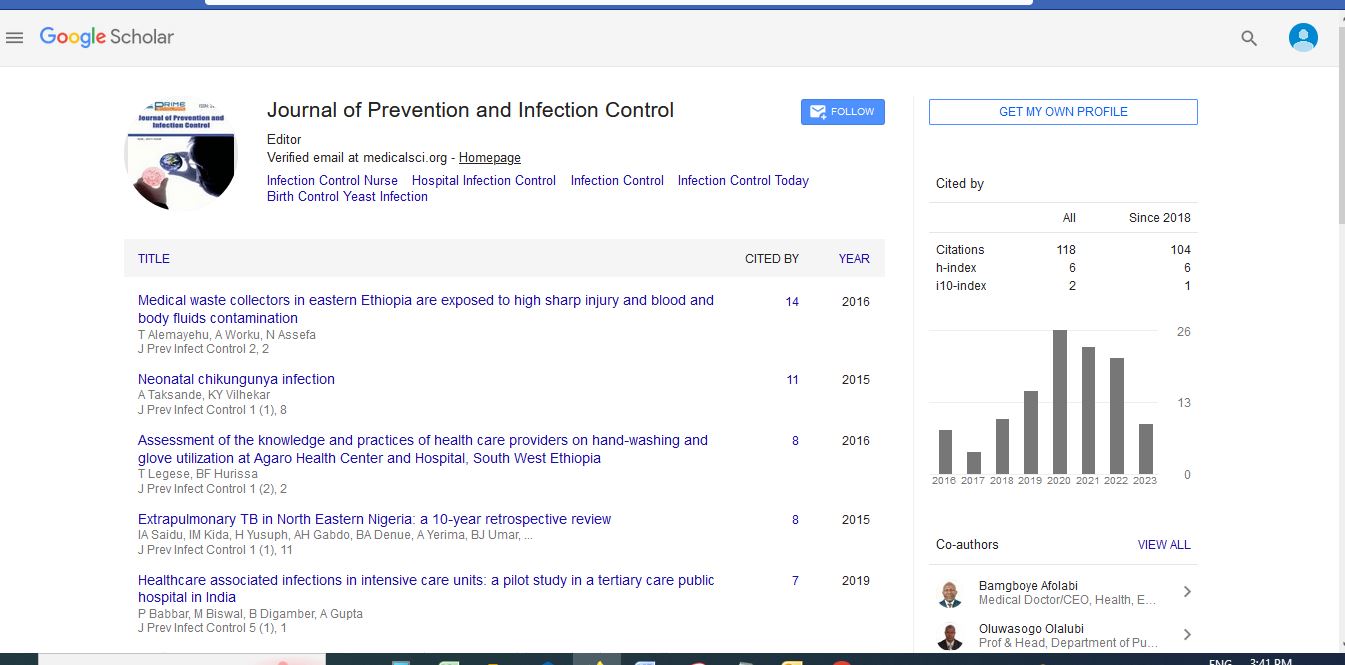Short Communication - (2024) Volume 10, Issue 2
Hygiene: The Foundation of Health and Well-Being
Misaki Yoshida*
Department of Medical Science, Ritsumeikan University, Japan
*Correspondence:
Misaki Yoshida,
Department of Medical Science, Ritsumeikan University,
Japan,
Email:
Received: 29-May-2024, Manuscript No. IPJPIC-24-20035;
Editor assigned: 31-May-2024, Pre QC No. IPJPIC-24-20035 (PQ);
Reviewed: 14-Jun-2024, QC No. IPJPIC-24-20035;
Revised: 19-Jun-2024, Manuscript No. IPJPIC-24-20035 (R);
Published:
26-Jun-2024, DOI: 10.36648/2471-9668-10.2.11
Introduction
Hygiene, often regarded as a mundane aspect of daily life, is in
fact the cornerstone of health and well-being. From washing
hands to maintaining clean surroundings, practicing good hygiene
habits plays a critical role in preventing the spread of infectious
diseases, promoting physical health, and fostering a sense of
dignity and self-respect. At its core, hygiene encompasses a
range of behaviours and practices aimed at preventing the
transmission of pathogens and maintaining personal and
environmental cleanliness. Hand hygiene, for example, is one of
the most effective measures for reducing the spread of infectious
diseases, including respiratory infections, gastrointestinal
illnesses, and skin infections. By washing hands with soap and
water or using hand sanitizers regularly, individuals can remove
germs from their hands and prevent them from spreading to
others. Moreover, hygiene extends beyond personal care to
include the cleanliness of living and working environments.
Keeping living spaces, bathrooms, kitchens, and public facilities
clean and sanitized helps minimize the accumulation of germs
and contaminants, reducing the risk of illness and infection.
Description
Regular cleaning of surfaces, floors, and common touchpoints
such as doorknobs, handles, and light switches can help break
the chain of transmission and create safer and healthier
environments for occupants. In healthcare settings, hygiene
practices are of paramount importance for preventing
Healthcare-associated Infections (HAIs) and safeguarding the
health of patients, healthcare workers, and visitors. Strict
adherence to infection prevention and control measures,
including hand hygiene, environmental cleaning, and the use
of Personal Protective Equipment (PPE), can help minimize
the risk of transmission of pathogens such as bacteria, viruses,
and fungi in healthcare facilities. Furthermore, hygiene plays a
crucial role in promoting mental and emotional well-being by
enhancing feelings of cleanliness, comfort, and self-confidence.
Maintaining personal hygiene habits such as bathing, grooming,
and oral care not only contributes to physical health but also
boosts self-esteem and social interactions. Similarly, living in
clean and well-maintained environments can reduce stress,
anxiety, and feelings of discomfort associated with clutter and
disorganization. Hygiene education and promotion are essential
components of efforts to improve public health and hygiene
practices. By raising awareness about the importance of hygiene
and providing education and resources to support hygiene
behaviours, communities can empower individuals to take charge
of their health and well-being. School-based hygiene programs,
community health initiatives, and public awareness campaigns
can help disseminate information about proper hygiene practices
and encourage behaviour change. In the face of global health
challenges such as the COVID-19 pandemic, the importance
of hygiene has been brought into sharp focus. Good hygiene
prevents the spread of diseases and infections, contributing to
overall well-being and quality of life [1-4].
Conclusion
Measures such as wearing masks, practicing physical distancing,
and maintaining hand hygiene have become essential tools for
controlling the spread of the virus and protecting vulnerable
populations. Moreover, the pandemic has underscored the
need for resilient healthcare systems and robust infection
prevention and control measures to prevent future outbreaks.
In conclusion, hygiene is a fundamental aspect of human health
and well-being that transcends cultural, social, and economic
boundaries. By embracing good hygiene practices and promoting
clean environments, individuals, communities, and societies can
protect themselves and others from infectious diseases, enhance
quality of life, and contribute to a healthier and more sustainable
future.
Acknowledgement
None.
Conflict Of Interest
None.
References
- Ling ML, Ching P, Cheng J, Lang L, Liberali S, et al. (2023) APSIC dental Infection Prevention and Control (IPC) guidelines. Am J Infect Control 12(1):53.
[Crossref] [Google Scholar] [PubMed]
- Drews FA, Visnovsky LC, Mayer J (2019) Human factors engineering contributions to infection prevention and control. Am J Infect Control 61(5):693-701.
[Crossref] [Google Scholar] [PubMed]
- Unuvar GK, Doganay M, Alp E (2021) Current infection prevention and control strategies of COVID-19 in hospitals. Am J Infect Control 51(SI-1):3215-3220.
[Crossref] [Google Scholar] [PubMed]
- Humphreys H (2020) Infection prevention and control advice out-of-hours. Am J Infect Control 105(4):795-796.
[Crossref] [Google Scholar] [PubMed]
Citation: Yoshida M (2024) Hygiene: The Foundation of Health and Well-being. J Prevent Infect Control. 10:11.
Copyright: © 2024 Yoshida M. This is an open-access article distributed under the terms of the Creative Commons Attribution License, which permits unrestricted use, distribution, and reproduction in any medium, provided the original author and source are credited.

